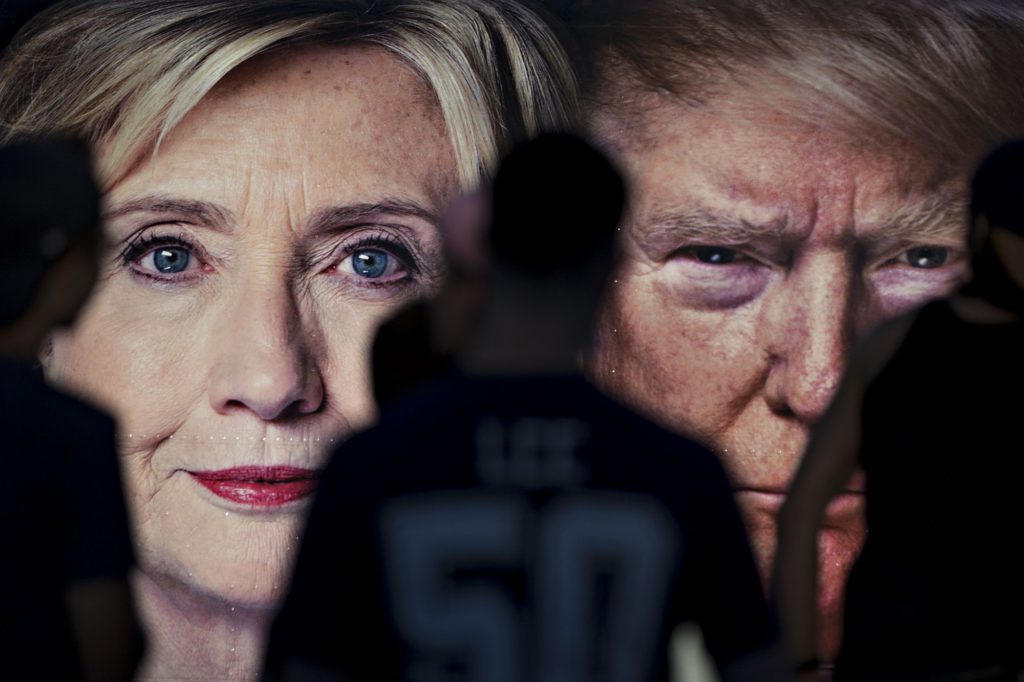(Bloomberg) — A lawyer for Hillary Clinton’s 2016 presidential campaign was found not guilty of lying to the FBI about the identity of his client when he provided a faulty tip on then-candidate Donald Trump two months before the election.
The jury verdict in favor of Michael Sussmann, a prominent cybersecurity lawyer with deep ties to the Democratic party, was handed down Tuesday in Washington. His two-week trial rehashed bitter divisions between the rival presidential campaigns and shined a light on the dark side of opposition research.
FBI officials said Sussmann falsely claimed he wasn’t representing a client when he handed over what he described as evidence of a suspicious communications link between computer servers at Trump Tower and a Russia-based bank tied to the Kremlin. The agency debunked the theory, but not before the media held it out as possible evidence of collusion. Sussmann’s lawyers said he’d offered the tip as a concerned citizen, not at the behest of the Clinton campaign.
“I told the truth to the FBI, and the jury clearly recognized that with their unanimous verdict today,” Sussmann told reporters outside the courthouse. “Despite being falsely accused, I am relieved that justice ultimately prevailed in this case.”
Sussmann’s trial was the first stemming from Special Counsel John Durham’s Trump-era probe into the conduct of the FBI’s broader Russia investigation, which the former president and his supporters have long called a “witch hunt.” Durham began looking into the origins of the FBI probe in May 2019, and before Tuesday, he’d gotten a guilty plea by a former FBI lawyer for falsifying a document.
After the verdict was read, Sussmann nodded his head, and then walked over to hug his children and his wife.
Durham didn’t respond to questions as he left the courtroom, but issued an emailed statement: “While we are disappointed in the outcome, we respect the jury’s decision and thank them for their service. I also want to recognize and thank the investigators and the prosecution team for their dedicated efforts in seeking truth and justice in this case.”
Read More: Prosecutors Struggle to Link Trump-Russia FBI Tip to Clinton
Former federal prosecutor Jennifer Rodgers said the verdict wasn’t a surprise to her.
“False statement cases are notoriously difficult to win for the government,” especially since the evidence presented by prosecutors in this case was weak, Rodgers said. “Which, of course, raises the excellent question of why this case was brought in the first place?”
Durham and Trump’s Justice Department appear to have been politically motivated to pursue the case, while Attorney General Merrick Garland likely felt compelled to let it proceed, rather than being accused of shutting the probe down for political reasons, she said.
“Obviously, not all of what Durham has been doing is public, so it’s possible there are real cases there,” Rodgers said. But if not, Garland should pull the plug, she added. “It’s a waste of time and taxpayer money to allow Trump’s vendetta to continue to play out in our Justice system.”
The server theory stemmed from a prominent cybersecurity expert, Rodney Joffe, who presented it to Sussmann. Joffe purportedly discovered the server link after mining publicly available communications data. Sussmann, who knew Joffe, brought the data to the attention of Clinton campaign general counsel and fellow Perkins Coie partner Marc Elias, who then got a small Washington-based research firm called Fusion GPS involved. Together they crafted a summary of the theory and a batch of data to support it, which would be quietly pitched to members of the media.
Clinton campaign manager Robby Mook testified that he believed the theory might be true but had low confidence in it and didn’t have the expertise to verify it. He said Clinton personally signed off on handing the data to the press.
More than a dozen witnesses offered conflicting accounts of why the tip was handed to the FBI. The government claimed Sussmann aimed to use the FBI as a “pawn” for political reasons, and the agency’s former general counsel testified that he felt he’d been misled by the lawyer. But Mook and the campaign’s top lawyer testified that the server tip was crafted for the media and that Sussmann had gone rogue by going to the FBI.
Sussmann’s defense hinged on his claim that he wasn’t technically representing the Clinton campaign or any other client when he brought the tip to the FBI, even though he allegedly billed the campaign for his time at the meeting. He also argued that the alleged lie didn’t matter, because the FBI was well aware of his ties to the Democratic National Committee and Clinton.
No one from the Clinton campaign or Fusion GPS were accused of wrongdoing.
Defense lawyers argued that the tip about the server was important even if they weren’t sure about its accuracy. The theory was developed at a time when Trump’s unusual ties to Russia had become a matter of public concern. While the server theory was discredited, other connections between Trump and Russia turned out to be true, as outlined in Special Counsel Robert Mueller’s report.
“Michael Sussmann should never have been charged in the first place,” his attorneys, Sean Berkowitz and Michael Bosworth, said in an emailed statement. “This is a case of extraordinary prosecutorial overreach. And we believe that today’s verdict sends an unmistakable message to anyone who cares to listen: politics is no substitute for evidence, and politics has no place in our system of justice.”
(Updates with comment from Rodgers)
More stories like this are available on bloomberg.com
©2022 Bloomberg L.P.











